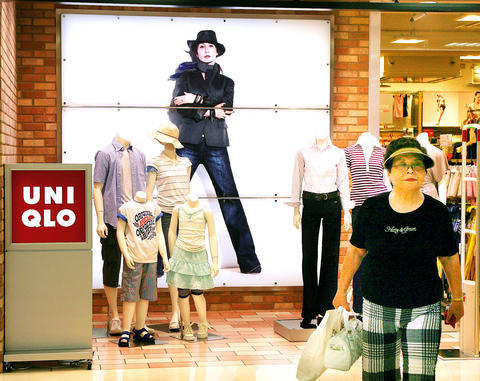Japan's Fast Retailing Co yesterday dropped out of the bidding war for Barneys New York Inc, clearing the way for Dubai firm Istithmar PJSC to buy the upscale US department store for US$942.3 million.
The defeat is a blow to the ambitions of the Japanese group to expand its operations overseas in the aim of being a global name in retail clothing.
Fast Retailing, which operates the Uniqlo chain of stores, decided not to trump the latest offer from the Dubai investment fund to buy Barneys from its US owner Jones Apparel Group Inc, a company spokesman said.

PHOTO: AFP
"In short, we are beginning to see a disparity between the value we find in the company and the price we would have to offer to acquire the company," Fast Retailing spokesman Terunobu Aono said.
"It is no longer rational from an economic standpoint," he said.
Fast Retailing entered the bidding for Barneys last month, topping an initial US$825 million offer from the Dubai firm.
But it was up against a powerful rival bidder. Istithmar is part of a conglomerate owned by the government of the Gulf emirate of Dubai, one of the seven members of the United Arab Emirates.
The takeover battle marked another twist in the history of the New York retailer that was started in 1923 by Barney Pressman and went through bankruptcy in the 1990s with heavy losses for Japanese investors.
In the mid-1990s, Japan's Isetan posted losses of US$168 million from loans to Barneys.
Under the Jones group, Barneys operates flagship stores in New York, Beverly Hills, Chicago, Boston and Dallas as well as several regional "warehouse" stores and others under the Barneys Co-Op name.
Fast Retailing on Sunday raised its bid for Barneys to US$950 million from US$900 million, underscoring its determination to snare the prestigious New York retailer.
Istithmar's later US$942.3 million offer was considered more attractive because Jones Apparel would have been required to pay the Dubai firm a US$34.7 million contract termination fee if it accepted the rival bid.
Fast Retailing's Uniqlo chain flourished during Japan's decade-long slump in the 1990s by selling cheap yet good quality clothing, mainly made in China.
The chain has since branched out in China, Britain and France and recently announced plans to open a flagship London store as part of its goal of overtaking industry leaders such as Zara and Hennes and Mauritz (H&M) to become the world's No. 1 casual wear company.

CHIP WAR: The new restrictions are expected to cut off China’s access to Taiwan’s technologies, materials and equipment essential to building AI semiconductors Taiwan has blacklisted Huawei Technologies Co (華為) and Semiconductor Manufacturing International Corp (SMIC, 中芯), dealing another major blow to the two companies spearheading China’s efforts to develop cutting-edge artificial intelligence (AI) chip technologies. The Ministry of Economic Affairs’ International Trade Administration has included Huawei, SMIC and several of their subsidiaries in an update of its so-called strategic high-tech commodities entity list, the latest version on its Web site showed on Saturday. It did not publicly announce the change. Other entities on the list include organizations such as the Taliban and al-Qaeda, as well as companies in China, Iran and elsewhere. Local companies need

CRITICISM: It is generally accepted that the Straits Forum is a CCP ‘united front’ platform, and anyone attending should maintain Taiwan’s dignity, the council said The Mainland Affairs Council (MAC) yesterday said it deeply regrets that former president Ma Ying-jeou (馬英九) echoed the Chinese Communist Party’s (CCP) “one China” principle and “united front” tactics by telling the Straits Forum that Taiwanese yearn for both sides of the Taiwan Strait to move toward “peace” and “integration.” The 17th annual Straits Forum yesterday opened in Xiamen, China, and while the Chinese Nationalist Party’s (KMT) local government heads were absent for the first time in 17 years, Ma attended the forum as “former KMT chairperson” and met with Chinese People’s Political Consultative Conference Chairman Wang Huning (王滬寧). Wang

LONG FLIGHT: The jets would be flown by US pilots, with Taiwanese copilots in the two-seat F-16D variant to help familiarize them with the aircraft, the source said The US is expected to fly 10 Lockheed Martin F-16C/D Block 70/72 jets to Taiwan over the coming months to fulfill a long-awaited order of 66 aircraft, a defense official said yesterday. Word that the first batch of the jets would be delivered soon was welcome news to Taiwan, which has become concerned about delays in the delivery of US arms amid rising military tensions with China. Speaking on condition of anonymity, the official said the initial tranche of the nation’s F-16s are rolling off assembly lines in the US and would be flown under their own power to Taiwan by way

CROSS-STRAIT: The MAC said it barred the Chinese officials from attending an event, because they failed to provide guarantees that Taiwan would be treated with respect The Mainland Affairs Council (MAC) on Friday night defended its decision to bar Chinese officials and tourism representatives from attending a tourism event in Taipei next month, citing the unsafe conditions for Taiwanese in China. The Taipei International Summer Travel Expo, organized by the Taiwan Tourism Exchange Association, is to run from July 18 to 21. China’s Taiwan Affairs Office spokeswoman Zhu Fenglian (朱鳳蓮) on Friday said that representatives from China’s travel industry were excluded from the expo. The Democratic Progressive Party government is obstructing cross-strait tourism exchange in a vain attempt to ignore the mainstream support for peaceful development